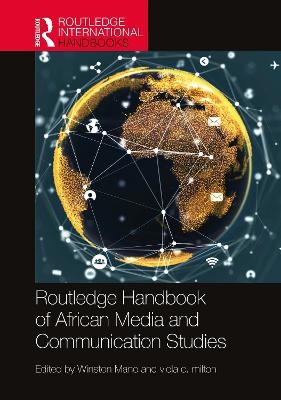
Routledge Handbook of African Media and Communication Studies
Routledge (Verlag)
978-0-367-68963-6 (ISBN)
This handbook comprises fresh and incisive research focusing on African media, culture and communication. The chapters from a cross-section of scholars dissect the forces shaping the field within a changing African context. It adds critical corpora of African scholarship and theory that places the everyday worlds, needs and uses of Africans first.
The book goes beyond critiques of the marginality of African approaches in media and communication studies to offer scholars the theoretical and empirical toolkit needed to start building critical corpora of African scholarship and theory that places the everyday worlds, needs and uses of Africans first. Decoloniality demands new epistemological interventions in African media, culture and communication, and this book is an important interlocutor in this space. In a globally interconnected world, changing patterns of authority and power pose new challenges to the ways in which media institutions are constituted and managed, as well as how communication and media policy is negotiated and the manner in which citizens engage with increasing media opportunities. The handbook focuses on the interrelationships of the local and the global and the concomitant consequences for media practice, education and citizen engagement in today’s Africa. Altogether, the book foregrounds convivial epistemologies relevant for locating African media and communication in the pluriverse.
This handbook is an essential read for critical media, communications, cultural studies and journalism scholars.
Winston Mano is a Reader and a member of the University of Westminster’s top-rated Communication and Media Research Institute (CAMRI). He is also a Course Leader for the MA in Media and Development and the Founder/Editor-in-Chief of the Journal of African Media Studies. Mano is also a Senior Research Fellow at the University of Johannesburg, South Africa. viola c. milton is a Professor in the Department of Communication Science at the University of South Africa. She is also co-chair of the South African Communication Association's Communications Advocacy and Activism Interest Group and Editor-in-Chief of the oldest South African journal in Communication Studies, Communicatio: South African Journal for Communication Theory and Research.
1. Decoloniality and the push for African media and communication studies: an introduction (Winston Mano and viola c. milton); 2. Afrokology of media and communication studies: theorising from the margins (Winston Mano and viola c. milton); 3. Frantz Fanon, Ngugi wa Thiong’o, and African media and communication studies (Pier Paolo Frassinelli); 4. Rethinking African strategic communication: towards a new violence (Colin Chasi); 5. Afrokology and organisational culture: why employees are not behaving as predicted (Elnerine WJ Gree); 6. To be or not to be: decolonizing African media/communications (Kehbuma Langmia); 7. Communicating the idea of South Africa in the age of decoloniality (Blessed Ngwenya); 8. Decolonising media and communication studies: an exploratory survey on global curricula transformation debates (Ylva Rodny-Gumede and Colin Chasi); 9. Africa on demand: the production and distribution of African narratives through podcasting (Rachel Lara van der Merwe); 10. The African novel and its global communicative potential: africa’s soft power (Mary-Jean Nleya); 11. Citizen journalism and conflict transformation: exploring netizens’ digitized shaping of political crises in Kenya (Toyin Ajao); 12. Ghetto ‘wall-standing’: counterhegemonic graffiti in Zimbabwe (Hugh Mangeya); 13. "Arab Spring" or Arab Winter: social media and the 21st-century slave trade in Libya (Ashley Lewis, Shamilla Amulega, and Kehbuma Langmia); 14. On community radio and African interest broadcasting: the case of Vukani Community Radio (VCR) (Siyasanga M. Tyali); 15. Not just a benevolent bystander: the corrosive role of private sector media on the sustainability of the South African Broadcasting Corporation (Kate Skinner); 16. Health communication in Africa (Elizabeth Lubinga and Karabo Sitto); 17. The politics of identity, trauma, memory and decolonisation in Neill Blomkamp’s Chappie (2015) (Beschara Karam); 18. Nollywood as decoloniality (Ikechukwu Obiaya); 19. Afrokology as a transdisciplinary approach to media and communication studies (viola c. milton and Winston Mano)
| Erscheinungsdatum | 17.08.2022 |
|---|---|
| Reihe/Serie | Routledge International Handbooks |
| Zusatzinfo | 5 Tables, black and white; 2 Line drawings, black and white; 9 Halftones, black and white |
| Verlagsort | London |
| Sprache | englisch |
| Maße | 174 x 246 mm |
| Gewicht | 560 g |
| Themenwelt | Geisteswissenschaften ► Geschichte |
| Naturwissenschaften ► Geowissenschaften ► Geografie / Kartografie | |
| Sozialwissenschaften ► Kommunikation / Medien ► Medienwissenschaft | |
| Sozialwissenschaften ► Soziologie ► Spezielle Soziologien | |
| ISBN-10 | 0-367-68963-4 / 0367689634 |
| ISBN-13 | 978-0-367-68963-6 / 9780367689636 |
| Zustand | Neuware |
| Haben Sie eine Frage zum Produkt? |
aus dem Bereich


